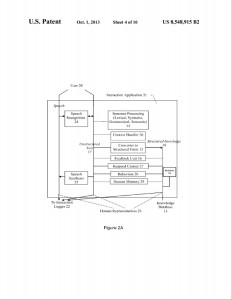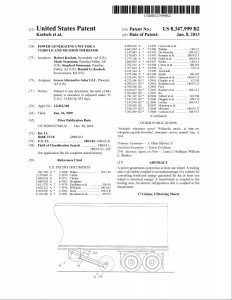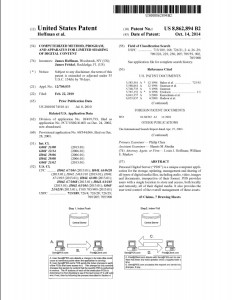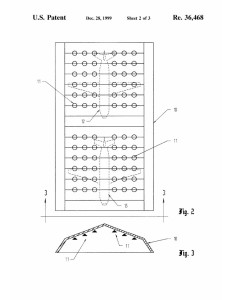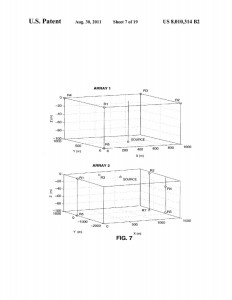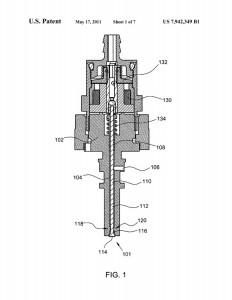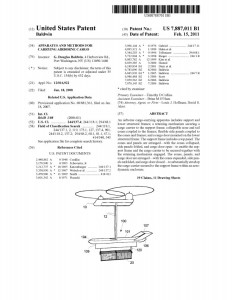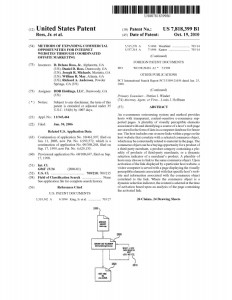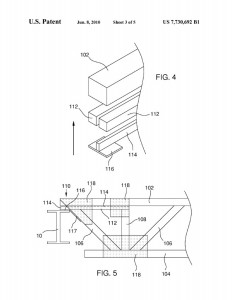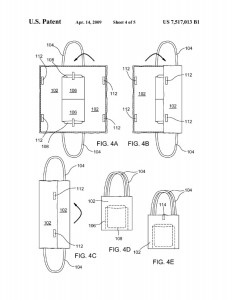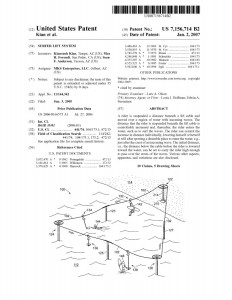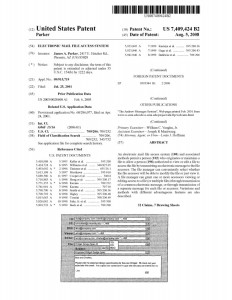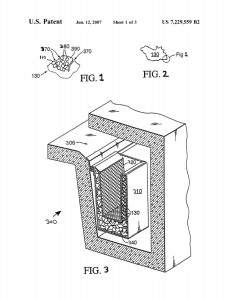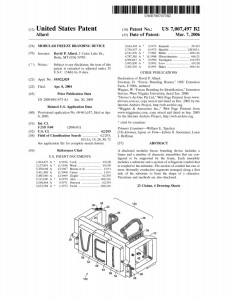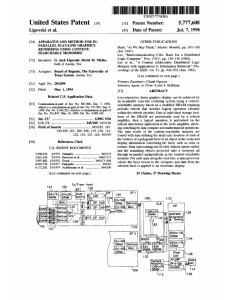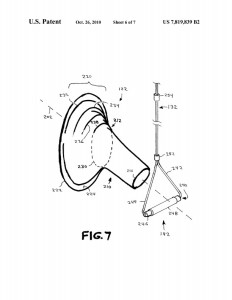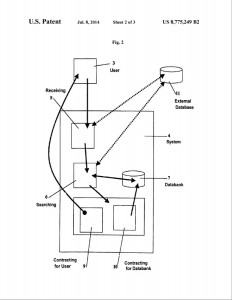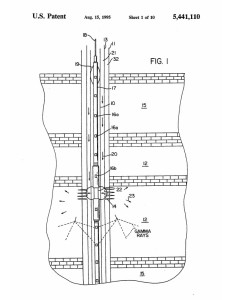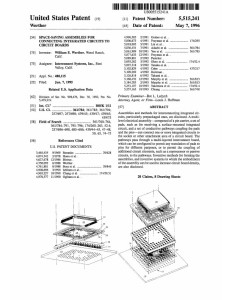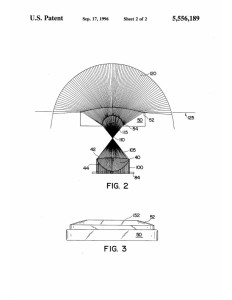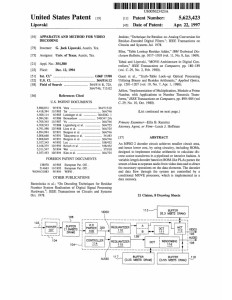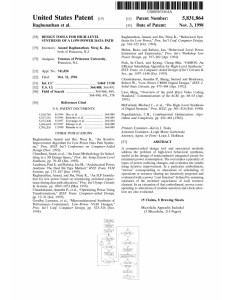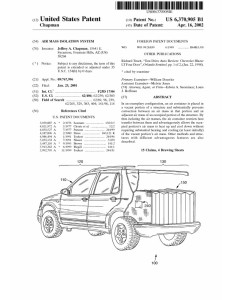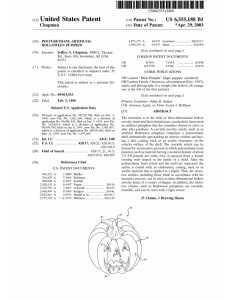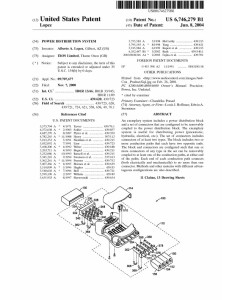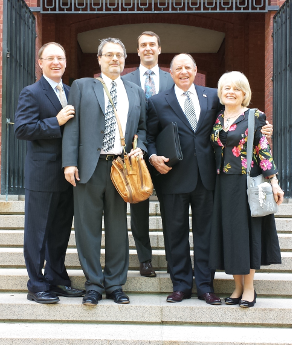
Mr. Hoffman (with litigation bag) with Danny and Del Ross, Mrs. Ross, and co-counsel Ian Crosby (rear) on the steps of the Federal Circuit Court of Appeals in
D.C. after oral argument in May 2014
Earlier this month, we were pleased to see a Federal Circuit affirmance (at least in part) of a judgment that our firm obtained for our long-time client, DDR Holdings. We have represented DDR for a full ten years.
DDR Holdings is a company formed by two co-inventors, Danny and Del Ross (“DDR” are their initials), to acquire patents of a start-up company called Nexchange, which failed in the “dot com bust” of 2000 after achieving significant initial success. We started this project as a licensing effort, but we were forced to litigate against six different targets. At the same time, we pursued continuation applications to protect the invention better, and we obtained three new patents, with a fourth still pending.
DDR’s story shows how difficult it can be for companies to obtain recoveries, and how much of an advantage it can be to have experienced and tenacious lawyers. Although DDR settled with five of the six defendants after putting in significant work on this case, over many years, the last defendant pursued its defenses through trial and appeal. The cost to that defendant undoubtedly well exceeded its initial exposure. With DDR’s victory, that defendant is likely ruing its past choices.
DDR won the following significant victories over the decade:
1. Success in Patent Office reexamination of two of the patents, while the lawsuit was stayed.
2. Obtaining new patents despite citation of all prior art cited in the litigation.
3. Staving off defense attempts to defeat the patent claims through summary judgment motions.
4. Winning all contested claim-construction issues.
5. Preventing defense efforts to significantly cramp expert testimony needed to prove DDR’s case.
6. Victory at trial (with strong co-counsel).
7. Defeat of all post-trial motions to reverse the jury’s verdict.
8. Defeat of all defenses proffered on appeal by the non-settling defendant.
After reading DDR’s brief, prepared by this firm, and hearing from Mr. Hoffman at oral argument, the Court of Appeals issued a precedential decision that favors inventors in four main respects:
A. In a widely hailed ruling, the Court upheld one of DDR’s continuation patents despite a challenge to its patentability on Section 101 grounds. Since the Supreme Court’s latest ruling on this legal point in June 2014, the Court of Appeals has issued seven decisions on 101 issues, and DDR’s patent is the only one that the Court upheld.
B. The Court further rejected a challenge to the claims as being excessively vague, which caused relief from those worried about potentially over-reaching application of the vagueness defense.
C. The Court further rejected a challenge to a damages claim seeking to impose a duty on expert witnesses to develop evidence of infringement on repeated dates, rather than using reasonable inferences in lieu of constant monitoring.
D. The Court refused to limit recoveries by patent owners who no longer practice their inventions.
The case disproves the oft-repeated politically motivated myth that it is too easy for plaintiffs to bring non-meritorious patent cases. DDR had to defeat more than sixty defenses raised in the course of a decade of litigation. Not every patent holder who reasonably believes he has a meritorious case can bear the substantial risk of financing reverse engineering work, technical and damage experts, deposition costs, and trial expenses. Although the DDR case has been profitable, it hardly shows any kind of unfairness in compensation or ease of suing. Indeed, after the unbroken string of successes described above, the jury’s damage award was far less than DDR had hoped, and the Court of Appeals second-guessed the jury on another of DDR’s patents (although of course a patent-holder need only win on one patent, not two, to obtain recovery).
We are pleased to have delivered a well-earned and well-deserved victory to the Rosses, who are some of the nicest clients one could ever hope to have. Although the odyssey was long and the path at times difficult, if DDR can prevail in obtaining compensation for use of its inventions, other start-ups who face similar obstacles can also hope that their R&D investments cannot just be appropriated by companies with greater marketing power or resources and higher arrogance quotients.
The purpose of the patent system is to encourage and provide incentive for investment in innovation, as the Constitution says. This time, it worked.

